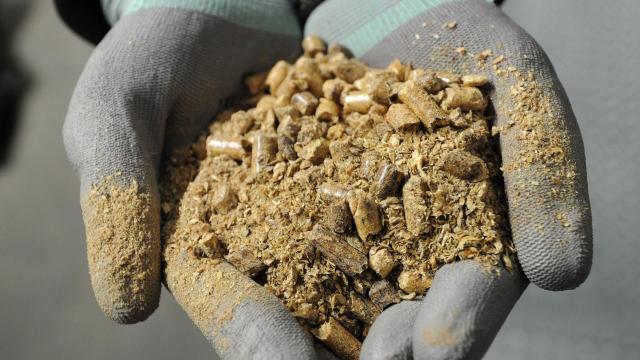One of the world’s biggest renewable energy players may be misleading the public about its product. Earlier this month, Mongabay published a damning report on Enviva, the world’s biggest producer of wood chips used for biomass energy, based on allegations from an anonymous former employee, who claimed that the company is producing its chips in a much less environmentally friendly way than its PR materials claim.
Biomass energy, the practice of burning wood to generate power, is one of those ideas that sounds great in practice: trees regrow, after all, so they should, theoretically, be a renewable resource. Trees, however, are a key carbon sink; destroying forests to burn energy could actually do more harm than good since trees take years to regrow back to their full carbon-sequestering potential. It can take more than 90 years, some analyses have shown, to pay back the “carbon debt” incurred by chopping down trees for fuel — time we simply don’t have.
Accordingly, pellet producers like Enviva claim that they use scrap wood from other production processes that would prevent wide-scale deforestation and keep the process efficient. “Displace Coal. Grow More Trees. Fight Climate Change,” an enormous banner on the front page of the company’s website reads. The website has a whole section devoted to the sustainability of its products, as well as a post on what constitutes “good biomass” — including biomass “made from low-value wood that is a by-product of a sawmill operation or a planned traditional timber harvest.”
But per Mongabay, Enviva isn’t telling the whole truth about its processes to the public. According to Mongabay reporter Justin Catanoso, the anonymous whistleblower, who reached out to Catanoso while still working at Enviva at the beginning of this year, called the company’s claims about using primarily waste material for pellets “a joke.”
“We use 100% whole trees in our pellets,” the whistleblower, who resigned from his position as a senior department head of two pellet plants in the spring, told Mongabay. “We hardly use any waste. Pellet density is critical. You get that from whole trees, not junk.”
Biomass energy has exploded in popularity in recent years, driven primarily by wood-burning plants in the EU that use pellets produced in the U.S. Southeast, which claim to produce renewable energy. As Mongabay reports, Enviva alone has constructed or expanded five pellet plants in the region since 2011; last year, Enviva made over $US1 ($1) billion.
Enviva has been careful to curate its image as working to save the environment — which means correcting misconceptions about the source of its products. In a 2022 CBS News report, Don Calloway, an Enviva spokesperson, corrected a reporter who mentioned the company using tree “trunks” for wood, insisting that the company instead uses “tops” and “limbs.” But the whistleblower says that the reality is different.
“We take giant, whole trees,” he told Mongabay. “We don’t care where they come from. The notion of sustainably managed forests is nonsense. We can’t get wood into the mills fast enough.”
“We are saddened and take issue by the allegations made by the former employee,” Enviva said in a statement to Mongabay. “The viewpoints expressed by this employee do not represent Enviva’s values nor are they accurate. While the source’s name was not revealed, we do not believe there is an employee fitting the description of what was shared that would have any credible or expert knowledge about the allegations made.”
Earther reached out to Enviva to see if the company had any further comment on the Mongabay story. We will update this story if a spokesperson responds to our requests.
Even if producers made pellets out of the material they claim to be utilising, biomass energy still has real problems. Shipping wood chips overseas creates huge amounts of emissions, creating a hefty carbon price that power plants don’t account for. And wood pellet factories in the Southeast have also been criticised for locating their plants in Black and brown communities and creating more pollution there.
As the Mongabay story shows, without further regulation and industry-wide standards, “eco-friendly” companies can continue to get away with dirty practices.
“We say we’re green. We say we care about the environment,” the whistleblower told Mongabay while still employed by Enviva. “I get so tired of hearing one thing and seeing another.”
